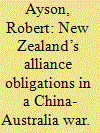| Srl | Item |
| 1 |
ID:
190705


|
|
|
|
|
| Summary/Abstract |
Amidst concerns that Australia may end up in a military confrontation with China, this article evaluates New Zealand’s formal and informal alliance obligations in such an event. In keeping with Wellington’s current declaratory policy, New Zealand’s obligations would be most pressing if the attack occurred on or near Australia, although these would be less clear if China favoured coercion over violence. New Zealand is also likely to have strong alliance obligations if Australian forces were attacked in the South Pacific, the leading area for Australia-New Zealand security cooperation. If Australian forces were attacked in East Asia, New Zealand may have some obligations under the trilateral ANZUS Treaty despite the suspension of Washington’s commitments to Wellington under the same agreement. While New Zealand’s military capacity to assist Australia in maritime East Asia is limited, this is where a serious clash involving Australian and Chinese forces seems most likely. Enlarging the geographical focus of the trans-Tasman alliance may be logical in this new setting, but it could also be hazardous.
|
|
|
|
|
|
|
|
|
|
|
|
|
|
|
|
| 2 |
ID:
104986


|
|
|
|
|
| Publication |
2011.
|
| Summary/Abstract |
Since 2005, a burgeoning wave of Chinese investments has set off a new 'minerals boom' in the Australian iron ore and coal mining sectors. While normally a welcome development, the state-owned and strategic nature of the investors has raised concerns in Australia about how these should be regulated. As a result, in February 2008 the Australian government declared an intention to more closely screen foreign direct investment (FDI) from state-owned sources, which both supporters and detractors alike have claimed is evidence of 'resource nationalism' in Australia's approach towards its trade and investment relationships with China. This article challenges this understanding through an examination of the characteristics of Chinese mining FDI, the dilemmas these present to the Australian government, and the relatively restrained nature of its response. Through this, Australia's FDI policy is explained as a defensive move against the potential for strategic behaviour by Chinese investors resulting from their state ownership, rather than any national program to subject minerals trade and investment to political control. On this basis, the article argues that Australian government policy instead evidences a 'resource liberalism' approach, which intends to ensure that the governance of Australia's minerals trade and investment with China remain market-based processes.
|
|
|
|
|
|
|
|
|
|
|
|
|
|
|
|